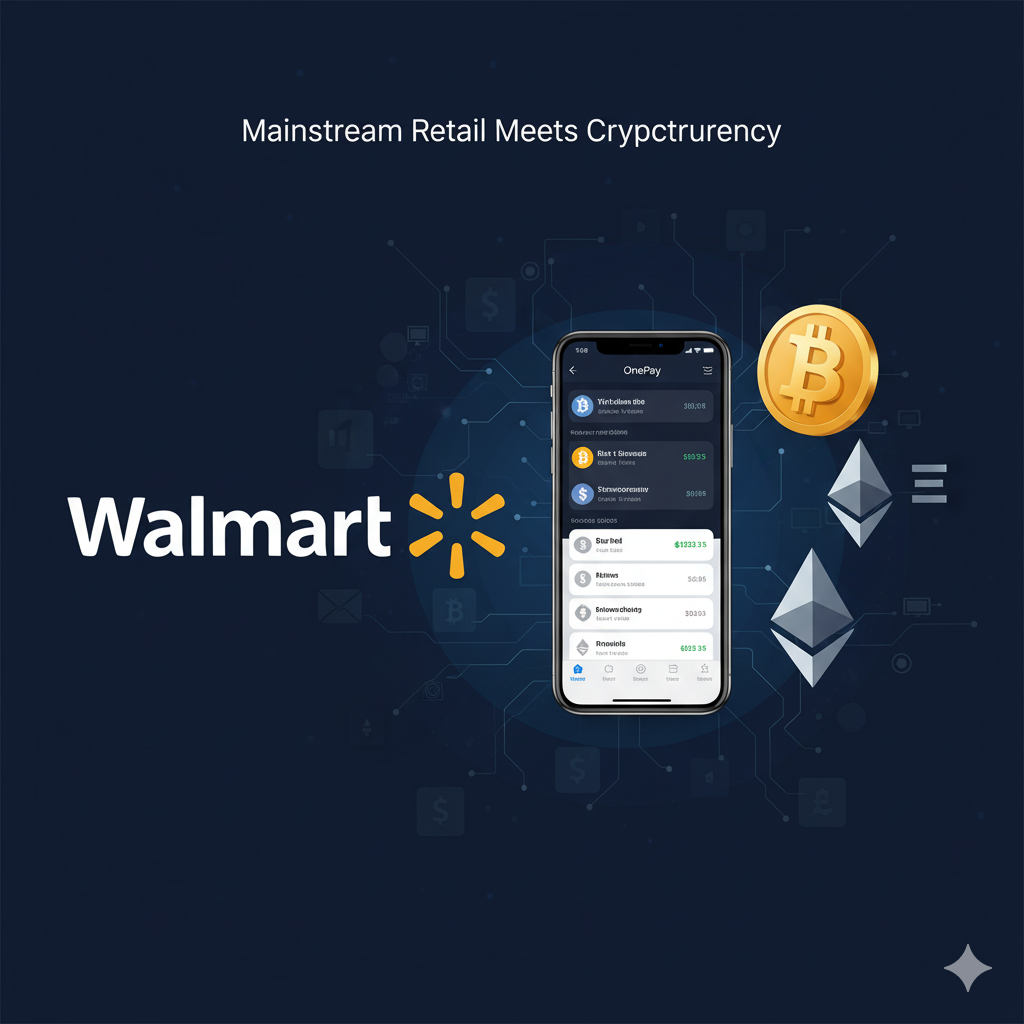Walmart-Backed OnePay Brings Crypto to 150 Million Shoppers
Walmart-backed OnePay launches Bitcoin & Ethereum trading, bringing crypto to 150M weekly shoppers. Users can convert digital assets to cash for instant Walmart purchases. Powered by Zerohash, this marks crypto's biggest retail integration yet. Q4 2025 rollout.

Walmart's fintech arm OnePay is launching Bitcoin and Ethereum trading later this year, powered by Zerohash infrastructure, marking a major step toward mainstream crypto adoption in retail.
WOW! 💥
— 𝓐𝓶𝓮𝓵𝓲𝓮 (@_Crypto_Barbie) October 6, 2025
CNBC announced on live TV that Walmart will now accept crypto via OnePay Cash! 💲
Walmart has over 150 million users! 🙌🏼 #XRP pic.twitter.com/7vlAbwhLbk
In a development that could reshape how Americans interact with digital assets, OnePay—the fintech firm majority-owned by Walmart—is preparing to offer cryptocurrency trading and custody services on its mobile app. According to CNBC reports, the platform will initially support Bitcoin (BTC) and Ethereum (ETH) through a partnership with Chicago-based crypto infrastructure provider Zerohash. This move positions OnePay alongside fintech giants like PayPal, Venmo, and Cash App in offering crypto services, but with one crucial advantage: direct integration with America's largest retailer.
Bridging Crypto and Commerce
The timing and structure of OnePay's crypto rollout reveal ambitious plans beyond simple trading. The platform will enable users to buy, hold, and convert Bitcoin and Ethereum directly within the app—but more significantly, users could convert their crypto holdings into cash and immediately use those funds for Walmart purchases or to pay off card balances. This seamless crypto-to-commerce integration represents a fundamental shift from viewing digital assets as speculative investments to positioning them as practical payment tools.
Founded in 2021 by Walmart and venture firm Ribbit Capital, OnePay has methodically expanded its "everything app" model to include high-yield savings accounts, credit and debit cards, buy now, pay later loans, and even wireless plans. The app currently ranks No. 5 on Apple's App Store for free finance apps, ahead of legacy institutions like JPMorgan Chase and Robinhood. With integration into Walmart's in-person and online checkout processes, OnePay reaches approximately 150 million Americans who shop at Walmart weekly—a distribution channel unmatched by traditional crypto platforms.
Regulatory Tailwinds and Industry Momentum
The cryptocurrency landscape has transformed dramatically since the election of President Donald Trump, whose administration has taken a notably crypto-friendly stance. This regulatory shift has unlocked opportunities that were previously restricted. Last month, Morgan Stanley announced it would offer retail clients direct crypto access through its E-Trade subsidiary, signaling broader institutional confidence.
The infrastructure powering OnePay's crypto features has also gained significant validation. Zerohash recently raised $104 million from major financial firms including Morgan Stanley and Interactive Brokers, strengthening its position as a critical bridge between traditional finance and blockchain technology. According to The Coin Republic, OnePay's disclosure confirms that Zerohash LLC and Zerohash Liquidity Services LLC will handle all crypto custody, with services initially available in select states. Notably, these crypto assets will not be covered by FDIC or SIPC insurance, following standard industry practice.
Market Implications and Bitcoin Performance
The broader cryptocurrency market has responded positively to institutional adoption signals. At the time of OnePay's announcement, Bitcoin was trading above $120,400, with Standard Chartered analyst Geoff Kendrick forecasting Bitcoin could reach $135,000 as institutional demand accelerates. Ethereum similarly demonstrated strength, outperforming Bitcoin with gains exceeding 2.4% in 24-hour trading.
The competitive landscape is shifting rapidly. Nearly all apps ranked ahead of OnePay on the App Store—including PayPal, Venmo, and Cash App—already offer crypto trading. OnePay's entry closes this feature gap while leveraging its unique retail ecosystem. For competitors, the pressure to develop comparable crypto strategies has intensified. Traditional financial institutions that have delayed digital asset offerings now face the prospect of losing ground to retail-integrated fintech platforms.
XRP and Ripple: A Different Path to Adoption
While OnePay's focus on Bitcoin and Ethereum aligns with mainstream institutional preferences, the announcement highlights a notable absence: no mention of XRP or other payment-focused cryptocurrencies. This omission is particularly significant given XRP's established role in cross-border payments and its growing institutional adoption.
XRP, developed by Ripple Labs, has positioned itself specifically as a bridge currency for financial institutions, processing over 2.14 million daily transactions with a market capitalization exceeding $180 billion. Major banks including SBI Holdings, Standard Chartered, and PNC have integrated XRP through Ripple's On-Demand Liquidity (ODL) service for faster, cheaper international settlements. Santander's One Pay FX uses RippleNet and XRP to enable same-day settlements for retail customers across multiple countries.
However, OnePay's retail-focused strategy differs fundamentally from XRP's institutional banking approach. While Ripple has secured partnerships with hundreds of financial institutions globally, very few utilize XRP directly for transactions—most prefer stablecoins or fiat rails for settlement. As Motley Fool analyst analysis notes, it makes little sense for businesses to move money with a volatile cryptocurrency when stablecoins offer price stability.
The regulatory clarity that emerged from Ripple's SEC settlement in 2024—determining that XRP is not a security when traded on public exchanges—could eventually open doors for platforms like OnePay to add XRP. With multiple spot XRP ETF applications pending SEC decisions between October 18-25, 2025, and President Trump's inclusion of XRP in the U.S. government's crypto strategic reserve, the asset's institutional legitimacy continues growing.
Yet the path forward for XRP in retail crypto platforms remains uncertain. Ripple's recent launch of the RLUSD stablecoin in December 2024 was intended to create incremental demand for XRP through transaction fees, but has yet to significantly impact adoption. XRP monthly transaction volume has actually trended lower throughout 2025, suggesting that retail adoption may lag behind institutional integration.
For XRP holders, OnePay's announcement represents both a missed opportunity and a validation of broader trends. While XRP isn't part of the initial rollout, the platform's architecture—built around crypto-to-cash conversion and retail spending—aligns conceptually with Ripple's vision of frictionless value transfer. If OnePay's experiment succeeds and consumer demand for additional cryptocurrencies emerges, XRP could be a logical next addition given its speed (3-5 second settlements) and low transaction costs (fractions of a cent).
The more immediate impact may be competitive pressure on Ripple to expand beyond institutional partnerships. With retail fintech platforms proving that consumers will actively trade and spend cryptocurrencies when the user experience is seamless, Ripple faces a strategic question: should it pursue direct consumer adoption through platforms like OnePay, or remain focused on its institutional banking relationships? Analysts project XRP could reach $5.05 by the end of 2025, driven partly by ETF approvals and regulatory clarity, but retail platform integration could provide additional momentum.
Looking Ahead: Crypto's Retail Revolution
OnePay's crypto integration represents more than another fintech offering cryptocurrency trading—it signals crypto's evolution from a speculative asset class to a practical financial tool. By embedding Bitcoin and Ethereum directly into a shopping and banking ecosystem that serves 150 million weekly customers, OnePay is testing whether mainstream Americans will adopt crypto as a spending mechanism rather than merely an investment vehicle.
The success of this rollout will likely depend on execution details not yet revealed: transaction fees, conversion spreads, user education, and the seamlessness of the crypto-to-cash-to-purchase flow. Technical and regulatory challenges remain, particularly around compliance across different state jurisdictions and managing the volatility inherent in cryptocurrency holdings.
If OnePay successfully navigates these hurdles, the implications extend beyond one platform. Other major retailers—Amazon, Target, Costco—may feel compelled to develop their own crypto strategies. Traditional banks will face pressure to accelerate digital asset offerings. And cryptocurrency projects focused on payments, including XRP, may find new opportunities to demonstrate real-world utility in retail environments.
For now, crypto enthusiasts and skeptics alike will be watching OnePay's Q4 2025 launch closely. The question isn't just whether Walmart shoppers will embrace crypto—it's whether this marks the tipping point where digital assets truly enter mainstream commerce.
Sources
- CNBC: Walmart-backed fintech OnePay is bringing crypto to its banking app
- CoinDesk: Walmart-Backed OnePay to Add Bitcoin and Ether Trading
- The Coin Republic: Breaking: Walmart OnePay to Launch Bitcoin, Crypto Trading
- Stocktwits: Walmart-Backed OnePay Plans Bitcoin, Ethereum Trading
- 99Bitcoins: Walmart's OnePay Set to Add Bitcoin, Ether Trading
- CoinCentral: Walmart-Backed OnePay to Add Bitcoin & Ether
- Webopedia: 12 Banks Using XRP
- CME Group: One Month of XRP Futures - Key Takeaways
- Motley Fool: Prediction - XRP Will Soar to This Price in 3 Years
- CoinLedger: Will XRP Hit $1,000?
- CoinPedia: Ripple XRP Price Prediction 2025-2030
DISCLAIMER: This newsletter is for informational purposes only and does not constitute investment advice, advertising, or a recommendation to buy, sell, or hold any securities. This content is not sponsored by or affiliated with any of the mentioned entities. Investments in cryptocurrencies or other financial assets carry significant risks, including the potential for total loss, extreme volatility, and regulatory uncertainty. Past performance is not indicative of future results. Always consult a qualified financial professional and conduct thorough research before making any investment decisions.



